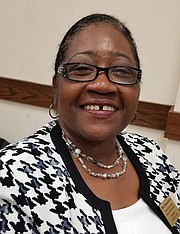Wednesday, November 27, 2019
Jackson attorney Shanda Yates will take her seat as Mississippi House District 64’s new Democratic representative after ousting 32-year incumbent Republican Bill Denny. Photo by Scott Crawford
"I think you have the wrong number," Jackson attorney Shanda Yates said, laughing into the receiver when Democratic House Minority Leader David Baria called in February, asking if she would be interested in running for a Republican-held Mississippi House seat. It sounded like a heavy lift; the House District 64 incumbent, House Republican Floor Leader Bill Denny, first won the seat in 1987—when Yates was only 6 years old.
With two weeks to go before the qualifying deadline for the party primaries, a number of fellow attorneys and Democratic leaders continued courting her, including Mississippi Democratic Party Chairman Bobby Moak.
Party leaders had taken notice of Yates, who is 38, early in the 2019 legislative session, after she met with Republican House Speaker Philip Gunn and wrote emails to representatives and senators, urging them not to pass the "Landowner Protection Act."
That tort-reform law, she warned in those emails, would "remove all liability of a property owner in virtually every context in which a crime is committed on its property" and free businesses of the "duty" to "act reasonably" to "protect its customers, patrons, and tenants from violent criminal activity that it knows is occurring on its property."
Despite her efforts and impassioned arguments from Democrats like Baria against the bill, the GOP-dominated Legislature passed it, and Gov. Phil Bryant signed it into law, drawing applause from business leaders. But Yates' proactive efforts left an impression.
"You're a good attorney. We need more level-headed attorneys in the Legislature," she recalled Baria, who is also an attorney, saying when he first called.
Baria will step down from his position at the Legislature when the new term begins in January, after deciding against running for re-election to his Bay St. Louis-area House seat early this year.
'I Had to Do It'
Yates had never thought about running for office and had a litany of reasons not to pursue the House District 64 seat when she first discussed the idea with her husband, Yancy Burns, her partner at their firm, Burns & Associates PLLC.
"No, I don't have the time to plan for this," Yates told her husband. "It's two weeks before the qualifying deadline. I never thought about doing this. I don't have any of the groundwork laid."
Exceeding expectations, including her own, though, has been a staple of Yates' life so far. In a Let's Talk Jackson podcast with Jackson Free Press editor Donna Ladd, Yates shared her personal story. Her father, Rick Yates, a blue-collar worker, raised her and her brother, Ricky, alone as a single parent. At Hinds Community College, Shanda Yates became the first in her family to earn a college degree. After earning her bachelor's degree at the University of Southern Mississippi, Yates thought she might end up working as a secretary for a law office. With encouragement from some of her professors, though, she went to law school at Mississippi College and became an attorney instead.
Despite her initial reluctance to run for office, Yates and her husband kept discussing the idea. "I talked to some of my close friends about it," Yates told the Jackson Free Press in mid-November. "And at the end of the day, it came down to did I want to continue complaining about things on Facebook and be passively active, which I realize is an oxymoron, or was I willing to put myself out there and jump off this cliff and try to do something to make a change?"
Yates thought about her home in Jackson, the business she and her husband are running here, and their 4-year-old son. She made the jump.
"I just decided that I had to do it, if not for me, then for my son. So, I said yes and hit the ground running," Yates said in the interview.
Over the next few months, Yates and a team of volunteers knocked on around 10,000 doors, she said. Several national organizations offered help, including the California-based Sister District, which targets GOP-held seats in legislatures across the country and tries to help Democrats turn them blue.
Sister District helped Yates with the technical "in the weeds stuff that I wouldn't have been able to handle on my own"—like field organizing, identifying likely supporters and tracking door knocking. Their support, Yates said, was "huge." The group also sent text messages to voters and knocked on doors.
Yates also had help from former U.S. Secretary of Agriculture Mike Espy, who in 2018 ran for U.S. Senate with the most modern campaign apparatus of any Democrat in Mississippi. Though Espy lost that race against incumbent U.S. Sen. Cindy Hyde-Smith, he came closer to a U.S. Senate victory than any Democrat in more than three decades—and amassed a trove of valuable voter data.
Just days after Hyde-Smith claimed victory with help from President Donald Trump, Espy filed for a rematch. Between then and his 2020 campaign kickoff in early November, though, the Democratic U.S. Senate hopeful used the resources and knowledge he gained during his 2018 campaign to help Democrats running for offices within the state.
Yates stood out, Espy told the Jackson Free Press on Nov. 25. "I knew intuitively that she had the glow of victory all around her from the first time I saw her," Espy said, recalling how impressed he was at the way she interacted with voters on whose doors she personally knocked.
When deciding which candidates he would get behind, Espy said he analyzed his own performance in electoral districts across the state. Despite Denny's long tenure, he identified Yates' district as the most "flippable." In 2018, Espy won among voters in House District 64 with 52% of the vote.
Espy helped Yates knock on doors, recorded a robocall and gave Yates a $1,000 donation. He also gifted her with district-level data that helped the Yates team identify voters who had supported Espy in his unsuccessful 2018 race against Republican U.S. Sen. Cindy Hyde-Smith the year. That data helped Yates lay the foundation for her own campaign's field plan, she said.
"He was very helpful, and I appreciate that, because I know he could have been working on his 2020 campaign at that point," Yates said. "But he understood the importance of the 2019 local elections, and I appreciate that very much."
'A New Dynamic'
Eight months after Yates launched her campaign and almost a year to the day since he conceded defeat to Hyde-Smith, Espy stood among a crowd of somber Democrats in downtown Jackson that included David Baria, watching as yet another Mississippi Democrat congratulated his Republican opponent.
Attorney General Jim Hood, the last Democrat who still held statewide office, was considered the party's best hope for recapturing the governorship for the first time since Republican Haley Barbour defeated Gov. Ronnie Musgrove in 2003. Though Hood came closer to winning than any Democratic candidate for governor since Musgrove won in 1999, he came up short.
Hood's loss not only meant that current Republican Lt. Gov. Tate Reeves will be Mississippi's next governor, but that for the first time in 143 years, the GOP will hold all eight statewide offices when the new slate of leaders take over in January. In House District 64, though, not far from Hood's election-night headquarters, Shanda Yates watched the Election Day numbers roll in. At the end of the night, she led Denny by just 136 votes. With hundreds of provisional ballots left to count by hand in Hinds County, though, it was not over, yet. For nearly two weeks after the election, she waited.
Finally, on Nov. 18, the Hinds County Election Commission confirmed to the Jackson Free Press and Yates that they had finished counting provisional ballots. With all 8,840 House District 64 votes counted, Yates beat the man who won the election when she was a young child by 168 votes. She won with 51% of the final tally.
"It's really exciting. It's also a little surreal if I'm being honest," she told the Jackson Free Press while driving from one meeting for incoming lawmakers to another about an hour after Hinds officials announced the final numbers. She had been attending meetings and "operating as if she had won since the morning after the election," she said.
"I always had in the back of my mind, 'This is probably not going to pan out at the end of the day, but I'm still going to give 100% and see how close I can get,'" she said.
Espy said Yates' victory in her largely suburban, 58% white district is evidence of "a new dynamic in Mississippi" and proves that "Mississippi is not immune to national trends." In recent national elections, majority-white suburban areas that were once solid GOP strongholds have trended toward Democrats.
Purpling of Suburbs
Though the state's minority party is not yet winning statewide and has a ways to go before it can hope to reclaim a majority in either chamber of the Legislature, Espy said he sees progress with each almost-win. Last year, he won 46% of the vote in the suburban Madison County; this year, Hood won Madison County, marking the first time a Democrat has done so in decades.
Yates' race is not the only one that demonstrates the purpling of suburbs in Mississippi, though. In DeSoto County's election for House District 40, which is situated within the Memphis suburbs, Hester Jackson-McCray, an African American woman, ousted GOP House Rep. Ashley Henley by just 14 votes this year. When Jackson-McCray last challenged Henley for her seat in 2015, Henley beat her 68.3% to 31.7%. Jackson-McCray is another candidate to whom Espy gave his support.
Merritt Baria worked as the deputy director for the Mississippi Democratic Trust this year, helping candidates including Yates and Jackson-McCray. She told the Jackson Free Press on Nov. 25 that Yates and Jackson-McCray's victories disproved the traditional Mississippi Democratic Party wisdom about who is "viable" and who isn't.
"I'm relatively new to the political sphere, and I know that there are people here who have been working in Democratic politics in Mississippi for decades, so I mean no disrespect when I say this," said Baria, the daughter of outgoing Democratic House Majority Leader Baria.
"I have observed during my short time working within this industry that there seems to be this idea that there are certain candidates that are viable and certain candidates that are not, and historically those candidates haven't been women," Merritt Baria said in the interview. "I think the takeaway here is wrong. Our two biggest winners this year were women, and one was a woman of color."
Espy pointed to another unsung victory that he said deserves more attention: Democrat Willie Simmons flipped the Central District transportation commissioner seat from red to blue. Simmons is the first black candidate to win a regional district-level race in Mississippi since Reconstruction. Democratic Jackson City Councilman De'Keither Stamps nearly achieved the same historic milestone this year, Espy pointed out; Stamps won 49.4% of the vote for public service commissioner on Nov. 5, narrowly losing to Republican Brent Bailey.
"Everybody's saying the Republicans have all the statewide offices, yeah, that's true. But look at the changes beneath for the real story," Espy said. "Paul Harvey used to say, 'For the rest of the story, look at the rest of the story.' Look at what's happening in Mississippi today. And so that's why I'm not discouraged. I see that change is imminent and growth is coming."
'No State Out of Reach'
Organizers at Sister District, whose efforts helped flip Virginia's GOP-led General Assembly to full-Democratic control this year, were thrilled with Yates' victory—their first in Mississippi since the group launched in the wake of the 2016 election.
"I think Shanda's win is a tremendous bright spot for us. We believe no district is out of reach, and no state is out of reach," Gaby Goldstein, Sister District's co-founder and political organizer, told the Jackson Free Press. "It's just a matter of providing inspiring candidates with resources they need."
Denny is not only the House Republican floor leader, but he is also the chairman of the Reappointment and Redistricting Committee, which would have put him in charge of overseeing redistricting of House seats in 2020.
In 2015, Democrats did not even bother to field a challenger to run against Denny. Jackson attorney Dorsey Carson, the last Democrat to challenge him, lost by 13 points in 2011.
Unlike many Democrats trying to unseat sitting Republicans in Mississippi, Yates did not portray herself as a moderate or conservative to woo voters in the other party.
"I talked to the people in my district about things that people in my district cared about and were concerned about," Yates told the Jackson Free Press. "Those things include infrastructure repairs, investing in our public schools and finding ways to incentivize small-business ownership. We didn't find many people who were interested in national issues or wanted to talk to me about my views on gun control or those sorts of things.
"If people did ask me questions, I answered them honestly, but that wasn't my campaign platform, and I think people appreciated that, because they want the issues that are at their front door—or at the end of their driveway, so to speak, if you're talking about infrastructure."
'Genuine' and 'Willing'
In other races, Republicans sent mailers to voters and ran ads trying to tie their Democratic opponents to national liberal and progressive politicians like U.S. House Speaker Nancy Pelosi or New York Congresswoman Alexandria Ocasio-Cortez. Denny did not do that, she said, but even if he had, she does not think it would have worked.
"If you're genuine, and you're willing to knock the doors and put in the hard work, I think people will pick up on that," Yates said. "So that's why I think it was in my favor that I got in front of as many people as I did door knocking, because they can see me. They had talked to me, they had listened to me, they made their own impression of me. It didn't come down to a demonizing mail piece where I was pitted with far-left national Democrats. That just never happened.
"I don't know why my opponent didn't do that, but I feel like it would have fallen on deaf ears regardless, because these people have talked to me and know me as a person," Yates added. "I was in the Junior League with several hundred of the people in my district. I'm a practicing attorney and know several hundred people in my district because of that. I think all of those interpersonal connections really mattered at the end of the day."
When she takes office in January, Yates plans to continue to focus on education and infrastructure, she said.
"Those are the things I campaigned on, and those are the things I'd genuinely like to see more funds, more resources pushed to while I'm there at the Legislature," she said. "I know as a baby legislator, so to speak, I'll have very little influence, especially considering I'm in the minority party. But I do hope to build relationships and connections and re-establish relationships with people there."
She cited Republican House Speaker Philip Gunn, whom she practiced law alongside for seven years. The representative-elect knows she will have to "work across party lines," she said, but she hopes she can use pre-existing connections to make inroads.
Just Her and the Male Judge
The first time Yates went to court for an ex-parte hearing, it was just her and the male judge in his chambers. While he was asking her questions about the motion she was there to present, the judge stepped into a small room about 6 feet from the conference table, which she quickly realized was a bathroom because he didn't close the door, she said.
"He left the door open and just proceeded to start peeing, and continued to ask me questions while he was peeing, and obviously I could hear him the whole time," she said, a story she also told in her "Let's Talk Jackson" podcast recently. "That was my first time as a licensed attorney appearing before a judge."
Yates said she was not sure whether it was a "chauvinist" show of "power" or if he was "just like that with everyone." As she prepares to take her seat in the Legislature, Yates said she brings plenty of professional experience handling sexist and degrading men. As one of the few women in the Legislature, she knows there is a not-insignificant chance she will have to deal with the sexism that comes with entering a historically male-dominated institution.
"My plan is to deal with those men the same way I've dealt with those men my entire life. That particular interaction with the judge didn't cause me to quit my job as an attorney or never go back to court. If anything, it emboldened me," Yates said.
"And I would like to think that the same would be true at the Legislature. I am going into it assuming that everyone will be respectful and courteous and decent, but if they're not, I will take it with a grain of salt and continue to do my job.
"I'm not there to change how they feel they should interact with women," she added. "I can only handle how I respond to it and whether I let that change who I am and what I plan to do."
Follow Jackson Free Press State Reporter Ashton Pittman on Twitter @ashtonpittman. Send tips to [email protected].





